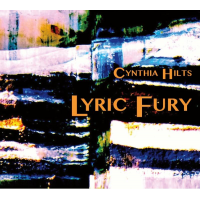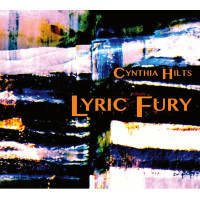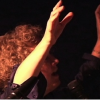Home » Jazz Musicians » Lyric Fury
Lyric Fury
When it comes to the handle of composer and pianist Cynthia Hilts’s intriguing octet, Lyric Fury, as the name suggests, the music is defined by powerful contrasts. Hilts likes to build from long, meditative passages to explosive endings. The tried and true technique of tension (and more tension) and release seldom yields more satisfaction or surprise. But as witness the brisk, striking originals on Lyric Fury, Hilts’s captivating new album, her orchestrations can go in different directions (and different keys) in the same moment, within the same beat or phrase. Imagine, if you will, a peaceful waltz through the meadow and a frantic run through a thunderstorm happening at the same time. Her music can fill the senses even as it swings like crazy. Together for several years, Lyric Fury boasts a lineup of top-drawer players with highly distinctive “A” games of their own. They include trumpet great and onetime Mingusite Jack Walrath, saxophonists Lisa Parrott and Lily White (who co-produced the album with Hilts), trombonist Deborah Weisz, cellist Marika Hughes, bassist Ratzo Harris, and drummer Scott Neumann. “When I first put the band together, I didn’t know most of the musicians,” confesses Hilts. “But I got really good at cold calling—hey, how would you like to work in a band that sounds like a celestial collision of Mingus and Debussy?” Over time, the members of Lyric Fury not only bought into Hilts’s demanding avant-meets-mainstream strategies, they found ways to enhance them. “My pieces are difficult, even the stuff I think is easy,” said Hilts, “and I can get a little tyrannical in getting people to do what I want.” But in the best sense, these musicians gave as good as they got. As reflected by the infectious opening track of Lyric Fury, “Those Basinites,” the Tucson native can write from the ground up. Inspired not by Count Basie but the quirky residents of Basin, Montana, where Hilts did several residencies, the tune started with what she called a “nice noodley line” in a slow 5/4 with swinging sixteenth notes. It took on a funky quality through the addition of a bass line that, she wrote in a lively but short-lived blog, “turned out to be so chunkily engaging that it was almost a forest unto itself” and ended up being re-fashioned into a more approachable, medium-tempo piece in which “the beat is about a heartbeat long rather than a long, slow breath.” But much of Hilts’s music, for which she writes her own poetic lyrics, responds to situations and events.
Read moreTags
Lyric Fury, The Adventurous Octet Led By Pianist/Composer Cynthia Hilts, Debuts On Record January 13

Source:
Terri Hinte Publicity
Twenty years ago, Brooklyn-based pianist/composer Cynthia Hilts was seeking to form a band “that sounds like a celestial collision of Mingus and Debussy” as a vehicle for her brisk, striking originals. Her avant-meets-mainstream writing, as the band name Lyric Fury suggests, is demanding and defined by powerful contrasts. Hilts and her octet have been honing a sound and a vision ever since, and their brilliant efforts are captured on their first recording together—the like-named Lyric Fury—set for January 13 release ...
read more
Cynthia Hilts & Lyric Fury Play the Triad Theatre

Source:
All About Jazz
CYNTHIA HILTS AND LYRIC FURY: original jazz to shake you up
Wednesday January 25th ONE SET ONLY AT 7pm
TRIAD THEATRE 158 West 72nd St between Broadway & Columbus
reservations highly recommended (212) 362-2511 $12 cover $10 min
eight master musicians ... one amazing composer
The press said: “The genius of talent and heart. Syncopation and nuance, rhythm and dissonance, sensitivity and personal expression - the compositions of a great ...
read more
Photos
Music
Recordings: As Leader | As Sideperson











